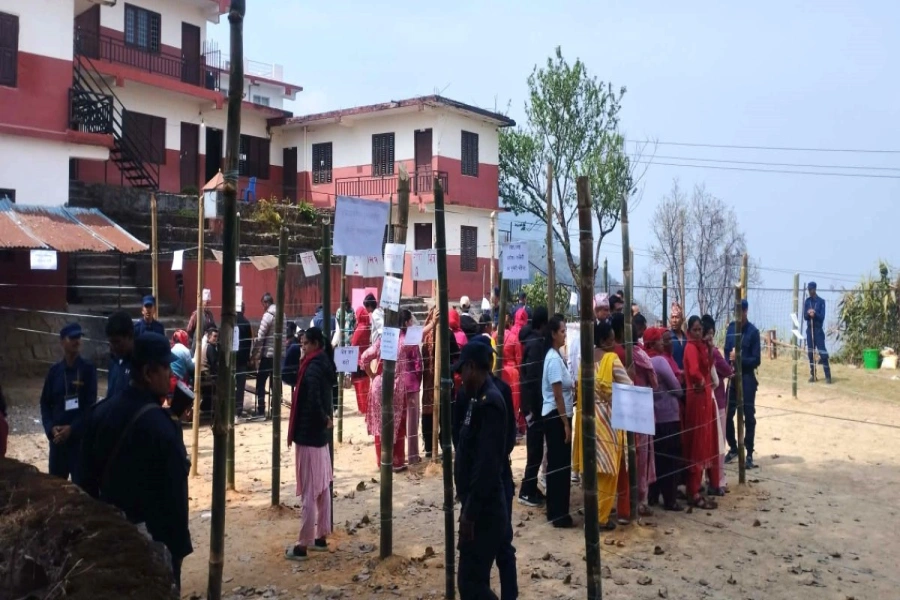KATHMANDU, Jan 22: Nepal has announced plans to organize the Sagarmatha Sambaad, a dialogue focusing on critical global and regional issues of significance.
Addressing a special program organized at the Office of Prime Minister and Council of Ministers in Singha Durbar on Tuesday, Prime Minister KP Sharma Oli announced that the first edition of the biannual event, scheduled to be held in Kathmandu from May 16 to 18, will center on the theme ‘Climate Change, Mountains, and the Future of Humanity.’ “This initiative aligns with Nepal’s consistent policy of promoting global understanding and cooperation through dialogue, consensus building, and collaboration,” he said.
Senior government officials and members of the diplomatic community were among those present in the special event organized to officially announce the Sagarmatha Sambaad event. The Sagarmatha Sambad, a global dialogue forum initiated by the government, was originally scheduled for April 2020 but had to be postponed due to the COVID-19 pandemic.
Sagarmatha Sambaad: main goal of Sagarmatha Sambaad is to forge...

The event will bring together global leaders, experts, and policymakers to discuss pressing issues related to climate change, mountains, and the future of humanity. The inaugural edition of the Sambaad will address the pressing issue of climate change, particularly its impact on mountains.
Highlighting the urgency, Prime Minister Oli remarked that climate change is not only part of the poly-crisis facing the world today but could also evolve into a ‘perma-crisis’ that threatens future generations. “This year alone, we have witnessed numerous disasters in diverse regions. Even nations with advanced economies and technology have not been spared by nature’s fury. The consequences of climate change will be catastrophic if we fail to halt this march of folly,” he said.
Prime Minister Oli emphasized that the concept of organizing this international event to advocate for climate justice stems from a deep conviction in the collective well-being of humanity. “By announcing the Sambaad today, we express our solidarity with the urgent call of the UN’s International Year of Glaciers’ Preservation 2025 to protect the rapidly receding glaciers and to raise awareness about the importance of rare resources like the snow-capped Himalayas and diminishing glaciers,” he stated.
Calling for the support of donors and partners to combat the adverse impacts of climate change, Prime Minister Oli reaffirmed Nepal’s commitment to achieving net-zero emissions by 2045. “Despite our minimal carbon footprint, Nepal faces devastating climate impacts. Nevertheless, we are committed to achieving net-zero emissions by 2045 and implementing ambitious climate plans. We have expanded forests, promoted clean energy, and safeguarded biodiversity,” he said.
Prime Minister Oli highlighted that Nepal’s snow-clad mountains serve as a natural stabilizer for the planet’s climate. Often referred to as the "Third Pole," the Himalayas play a vital role in maintaining the health of the oceans. “These snow-covered peaks act as heat sinks. Their glaciers and snowmelt feed rivers that sustain vegetation, ecosystems, and the lives of downstream communities. Tragically, this global ‘Water Tower’ is drying out,” he stated.
The prime minister also expressed concern over the rapid melting of snow and unpredictable precipitation, which have turned once-glittering white mountains into bare black rocks in Nepal. “From the roof of this building, we can see the fast-depleting ice coverage in Ganesh and Dorje Lhakpa Himal. The worry is not merely aesthetic. It is not about whether the mountains remain photogenic. The survival of people, societies, and cultures is at stake amid the increasing climate disasters,” he warned.
Referring to the flash flood in Thame in the Everest region in 2024 during a Glacier Lake Outburst Flood and the incessant post-monsoon downpour in Bagmati Province, Prime Minister Oli said such events, once rare, have now become routine phenomena. “We cannot forever overcompensate for the complacency of those historically responsible for the climate crisis. I believe the first edition of Sagarmatha Sambaad will provide an open platform to address these issues earnestly,” he added. “Together, we can forge a sustainable and equitable future – a future of resilience against the ‘poly-crisis.’”




































